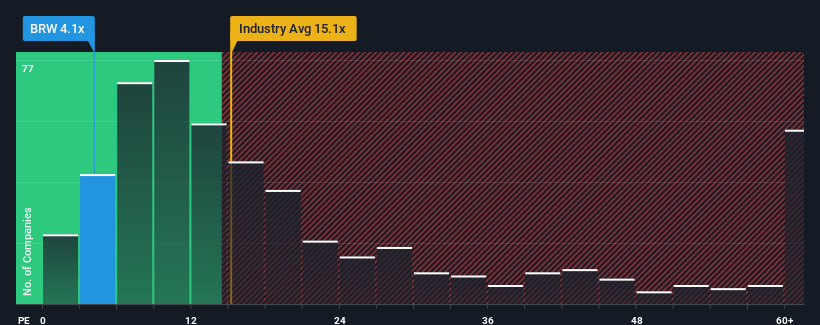Insufficient Growth At Bremworth Limited (NZSE:BRW) Hampers Share Price
Bremworth Limited's (NZSE:BRW) price-to-earnings (or "P/E") ratio of 4.1x might make it look like a strong buy right now compared to the market in New Zealand, where around half of the companies have P/E ratios above 16x and even P/E's above 32x are quite common. Nonetheless, we'd need to dig a little deeper to determine if there is a rational basis for the highly reduced P/E.
With earnings growth that's exceedingly strong of late, Bremworth has been doing very well. One possibility is that the P/E is low because investors think this strong earnings growth might actually underperform the broader market in the near future. If you like the company, you'd be hoping this isn't the case so that you could potentially pick up some stock while it's out of favour.
View our latest analysis for Bremworth

Want the full picture on earnings, revenue and cash flow for the company? Then our free report on Bremworth will help you shine a light on its historical performance.
Is There Any Growth For Bremworth?
In order to justify its P/E ratio, Bremworth would need to produce anemic growth that's substantially trailing the market.
If we review the last year of earnings growth, the company posted a terrific increase of 375%. Although, its longer-term performance hasn't been as strong with three-year EPS growth being relatively non-existent overall. Accordingly, shareholders probably wouldn't have been overly satisfied with the unstable medium-term growth rates.
This is in contrast to the rest of the market, which is expected to grow by 8.8% over the next year, materially higher than the company's recent medium-term annualised growth rates.
With this information, we can see why Bremworth is trading at a P/E lower than the market. Apparently many shareholders weren't comfortable holding on to something they believe will continue to trail the bourse.
The Key Takeaway
Using the price-to-earnings ratio alone to determine if you should sell your stock isn't sensible, however it can be a practical guide to the company's future prospects.
We've established that Bremworth maintains its low P/E on the weakness of its recent three-year growth being lower than the wider market forecast, as expected. Right now shareholders are accepting the low P/E as they concede future earnings probably won't provide any pleasant surprises. Unless the recent medium-term conditions improve, they will continue to form a barrier for the share price around these levels.
Before you settle on your opinion, we've discovered 3 warning signs for Bremworth (1 is a bit concerning!) that you should be aware of.
If these risks are making you reconsider your opinion on Bremworth, explore our interactive list of high quality stocks to get an idea of what else is out there.
Have feedback on this article? Concerned about the content? Get in touch with us directly. Alternatively, email editorial-team (at) simplywallst.com.
This article by Simply Wall St is general in nature. We provide commentary based on historical data and analyst forecasts only using an unbiased methodology and our articles are not intended to be financial advice. It does not constitute a recommendation to buy or sell any stock, and does not take account of your objectives, or your financial situation. We aim to bring you long-term focused analysis driven by fundamental data. Note that our analysis may not factor in the latest price-sensitive company announcements or qualitative material. Simply Wall St has no position in any stocks mentioned.

 Yahoo Finance
Yahoo Finance 